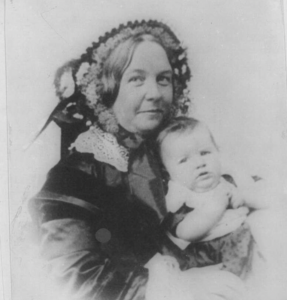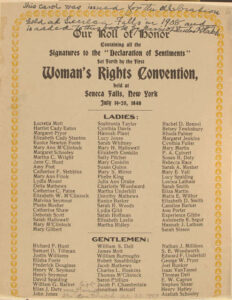The history of mankind is a history of repeated injuries and usurpations on the part of man toward woman, having in direct object the establishment of an absolute tyranny over her.
INTRODUCTION

Elizabeth Cady Stanton (1815-1902) was the principal author of the Declaration of Sentiments, which emerged from one of the first women’s rights gatherings in the United States. Over two days at the Wesleyan Chapel in Seneca Falls, New York, July 19-20, 1848, a few hundred women and men debated the future of what their official report described as the “social, civil, and religious condition of woman.” Stanton had been a driving force behind this early feminist movement, along with noted Pennsylvania abolitionist and Quaker activist, Lucretia Mott, and a few others from among their mutual friends and relatives. Most of these women had been radicalized during the 1840s by their experiences in fighting slavery. In April 1848, the New York state legislature had also begun reforming certain common law doctrines that had limited married women’s rights to their own property. Most feminists at Seneca Falls considered this measure as only a first step and that’s why they were intent on gathering in upstate New York. When Stanton read the now-famous expression of sentiments at the convention’s opening session (for women only), the effect was electrifying. A masterful propaganda document, this “declaration” rewrote the original Declaration of Independence in a fashion designed to highlight the hypocrisy of a country claiming a commitment to natural rights. Male allies such as Frederick Douglass then joined the convention on its second day and the group voted on a series of resolutions, including support for women’s suffrage. Ultimately, nearly one hundred attendees signed the new Declaration. Sadly, however, the original handwritten document for this landmark statement on gender equality has never been recovered.
SOURCE FORMAT: Public document (full)
WORD COUNT: 1,000 words
When, in the course of human events, it becomes necessary for one portion of the family of man to assume among the people of the earth a position different from that which they have hitherto occupied, but one to which the laws of nature and of nature’s God entitle them, a decent respect to the opinions of mankind requires that they should declare the causes that impel them to such a course.
We hold these truths to be self-evident; that all men and women are created equal; that they are endowed by their Creator with certain inalienable rights; that among these are life, liberty, and the pursuit of happiness; that to secure these rights governments are instituted, deriving their just powers from the consent of the governed. Whenever any form of Government becomes destructive of these ends, it is the right of those who suffer from it to refuse allegiance to it, and to insist upon the institution of a new government, laying its foundation on such principles, and organizing its powers in such form as to them shall seem most likely to effect their safety and happiness. Prudence, indeed, will dictate that governments long established should not be changed for light and transient causes; and accordingly, all experience hath shown that mankind are more disposed to suffer, while evils are sufferable, than to right themselves, by abolishing the forms to which they are accustomed. But when a long train of abuses and usurpations, pursuing invariably the same object, evinces a design to reduce them under absolute despotism, it is their duty to throw off such government, and to provide new guards for their future security. Such has been the patient sufferance of the women under this government, and such is now the necessity which constrains them to demand the equal station to which they are entitled.
Excerpt from “Declaration of Sentiments,” read by Jordyn Ney and Nick Rickert:
The history of mankind is a history of repeated injuries and usurpations on the part of man toward woman, having in direct object the establishment of an absolute tyranny over her. To prove this, let facts be submitted to a candid world.
He has never permitted her to exercise her inalienable right to the elective franchise.
He has compelled her to submit to laws, in the formation of which she had no voice.
He has withheld from her rights which are given to the most ignorant and degraded men – both natives and foreigners.
Having deprived her of this first right of a citizen, the elective franchise, thereby leaving her without representation in the halls of legislation, he has oppressed her on all sides.
He has made her, if married, in the eye of the law, civilly dead.
He has taken from her all right in property, even to the wages she earns.
He has made her, morally, an irresponsible being, as she can commit many crimes, with impunity, provided they be done in the presence of her husband. In the covenant of marriage, she is compelled to promise obedience to her husband, he becoming, to all intents and purposes, her master – the law giving him power to deprive her of her liberty, and to administer chastisement.
He has so framed the laws of divorce, as to what shall be the proper causes of divorce; in case of separation, to whom the guardianship of the children shall be given, as to be wholly regardless of the happiness of women – the law, in all cases, going upon the false supposition of the supremacy of man, and giving all power into his hands.
After depriving her of all rights as a married woman, if single and the owner of property, he has taxed her to support a government which recognizes her only when her property can be made profitable to it.
He has monopolized nearly all the profitable employments, and from those she is permitted to follow, she receives but a scanty remuneration.
He closes against her all the avenues to wealth and distinction, which he considers most honorable to himself. As a teacher of theology, medicine, or law, she is not known.

He has denied her the facilities for obtaining a thorough education – all colleges being closed against her.
He allows her in Church as well as State, but a subordinate position, claiming Apostolic authority for her exclusion from the ministry, and with some exceptions, from any public participation in the affairs of the Church.
He has created a false public sentiment, by giving to the world a different code of morals for men and women, by which moral delinquencies which exclude women from society, are not only tolerated but deemed of little account in man.
He has usurped the prerogative of Jehovah himself, claiming it as his right to assign for her a sphere of action, when that belongs to her conscience and her God.
He has endeavored, in every way that he could to destroy her confidence in her own powers, to lessen her self-respect, and to make her willing to lead a dependent and abject life.
Now, in view of this entire disfranchisement of one-half the people of this country, their social and religious degradation, – in view of the unjust laws above mentioned, and because women do feel themselves aggrieved, oppressed, and fraudulently deprived of their most sacred rights, we insist that they have immediate admission to all the rights and privileges which belong to them as citizens of these United States.
In entering upon the great work before us, we anticipate no small amount of misconception, misrepresentation, and ridicule; but we shall use every instrumentality within our power to effect our object. We shall employ agents, circulate tracts, petition the State and national Legislatures, and endeavor to enlist the pulpit and the press in our behalf. We hope this Convention will be followed by a series of Conventions, embracing every part of the country.
Firmly relying upon the final triumph of the Right and the True, we do this day affix our signatures to this declaration.
Lucretia Mott
Harriet Cady Eaton
Margaret Pryor
Elizabeth Cady Stanton
[Signed by an additional 64 other women and 32 men]
CITATION
Declaration of Sentiments, July 19, 1848, Seneca Falls, NY, Reproduced by the National Park Service
DISCUSSION QUESTIONS
- Why was rewriting the Declaration of Independence to include women and their grievances against male tyranny an especially effective rhetorical strategy in nineteenth-century America?
- In this version of the “train of abuses,” Elizabeth Cady Stanton began with a complaint about the denial of female voting rights (“elective franchise”), but she focused on many other types of injustices toward women. What were some of the leading complaints lodged in this Declaration of Sentiments?
- If women today were to rewrite this 1848 Declaration, what new grievances might be appropriate to include, or what old grievances might still be considered relevant?
FURTHER READING
As the first women’s rights convention, Seneca Falls initiated the organized women’s rights movement in the United States. – Judith Wellman
History Channel segment on Seneca Falls
- FEATURED COLLECTION: Shall Not Be Denied (Library of Congress)
- “Report of the Women’s Rights Convention,” 1848 (National Park Service)
- Megan Smith, The Lost History: Help Us Find the Declaration of Sentiments, White House (October 14, 2015)
- Judith Wellman, The Seneca Falls Convention, Gilder Lehrman Institute of American History, AP US History Study Guide, 2009-19
- STUDENT CLOSE READING: By Nick Rickert (’22)
- Handout –Declaration of Sentiments
